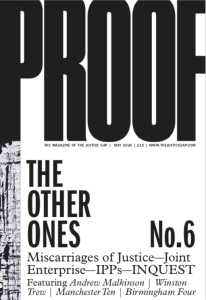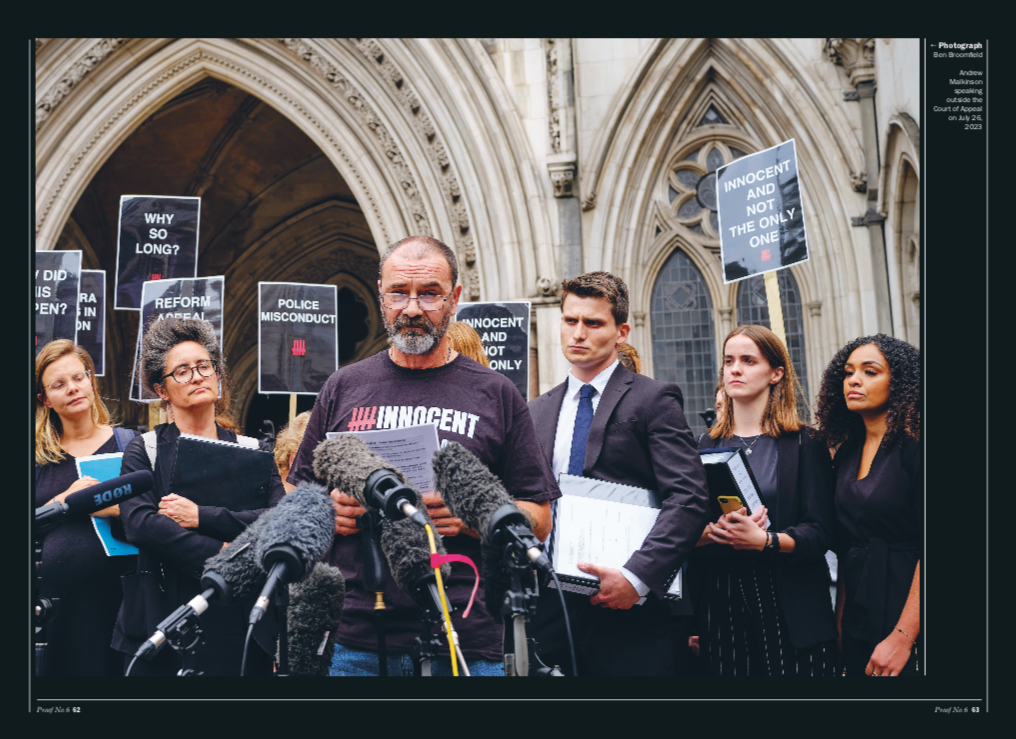It is understood that the Lord Chancellor is to seek the removal of the head of the miscarriage of justice watchdog following the publication today of a long-awaited and damning report into its failings over the wrongful conviction of Andrew Malkinson.
Andrew Malkinson was wrongly imprisoned for 17 years for a rape he did not commit and only had his conviction overturned last July after the CCRC rejected his case twice previously in 2012 and 2020. The independent review established by the Criminal Cases Review Commission itself and headed by Chris Henley KC made ‘severe criticism’ of the group concluding that it could have sent the case back as early as 2009. The report highlights internal documents showing that in 2022 the CCRC was contemplating rejecting Malkinson’s case a third time despite
‘compelling’ DNA evidence.
 Speaking today, Andrew Malkinson said he was was ‘very pleased’ that justice secretary Shabana Mahmood was looking to replace CCRC chair Helen Pitcher OBE who, in his view, had ‘proved herself utterly unfit to lead the CCRC’. ‘I hope this will be followed with a complete overhaul which transforms the CCRC into a body that delivers justice to wrongfully convicted people like me,’ Malkinson said. ‘Ms Pitcher’s discredited senior leadership team should also now go, and be replaced with people who are serious about fighting miscarriages of justice.’
Speaking today, Andrew Malkinson said he was was ‘very pleased’ that justice secretary Shabana Mahmood was looking to replace CCRC chair Helen Pitcher OBE who, in his view, had ‘proved herself utterly unfit to lead the CCRC’. ‘I hope this will be followed with a complete overhaul which transforms the CCRC into a body that delivers justice to wrongfully convicted people like me,’ Malkinson said. ‘Ms Pitcher’s discredited senior leadership team should also now go, and be replaced with people who are serious about fighting miscarriages of justice.’
‘Helen Pitcher’s removal as chair will be a real victory for Andy and the rest of us who know the CCRC has been failing miscarriage of justice victims for years. APPEAL welcomes the Justice Secretary’s decisive action, and hopes it will be followed with root and branch changes, including bringing in a fresh leadership team.’
James Burley, who led APPEAL’s investigation into Andrew Malkinson’s case
Too little, too late
Helen Pitcher this morning finally apologised to Andrew Malkinson. ‘Mr Henley’s report makes sobering reading, and it is clear from his findings that the Commission failed Mr Malkinson,’ she said. ‘For this, I am deeply sorry and wish to offer my sincere regret and an unreserved apology on behalf of the Commission. I want to assure everyone of our commitment to learn from this… Nobody can begin to imagine the devastating impact that this wrongful conviction has had on Mr Malkinson’s life, and I am deeply sorry for the additional harm caused by our handling of the case. On behalf of the Commission, I offer my deepest regret.’
Chris Henley took the opportunity to highlight the institutional reluctance to take responsibility for wrongful convictions at the heart of the criminal justice system – not just the CCRC and including the Court of Appeal. A main theme of his report was the ‘deep-seated, system-wide, cultural reluctance which starts right at the top in the Court of Appeal to acknowledge our Criminal Justice System will on occasion make mistakes, that entirely innocent defendants will sometimes be convicted’.
‘Miscarriages of justice disfigure the lives of all connected to the case and make the public generally less safe,’ reflected the barrister at the end of his 105-page report. ‘Mr Malkinson has suffered atrocious injustice for a very long time. There needs to be a culture within our criminal justice system where it is acknowledged that mistakes can be made, and in our various roles, when making decisions we are all alive to this potential risk.’ When mistakes are made the victims of miscarriages need ‘a robust, appropriately resourced, bold, mission driven organisation, fearlessly asking the right questions, and analysing new evidence and submissions rigorously, and above all correctly identifying the cases that should be referred. This is what the CCRC must always aspire to be.’
The KC highlighted the chronic underfunding of the watchdog. He reported its annual budget for the 2024, in real terms, was 17% less than the amount it had previously received on average since 1997 whereas the numbers of cases had ‘grown enormously during the same period’. ‘It is unreasonable to require the CCRC to improve the perception and reality of its performance without providing it with the commensurate level of resources it needs to achieve this. This is an urgent issue and needs to be addressed as soon as possible.’
However Henley’s focus was also on longstanding problems at the CCRC. He pointed to opportunities missed going back to 2009 (before Pitcher) and, what he labelled, ‘a complete failure’ by the CCRC to ‘get to grips with the potential significance’ of the then new DNA evidence.
The barrister criticised the CCRC for not making disclosure failures unearthed by APPEAL ‘a second freestanding ground of referral’ when it finally sent the case to the Court of Appeal in 2023. ‘It concerns me that if the new DNA evidence had not been obtained and only the disclosure failures… had come to light, the CCRC would not have made the referral,’ he said. ‘This suggests… that the CCRC is taking too cautious an approach. This needs urgently to change.’
Chris Henley said criticisms of Helen Pitcher’s seeming reluctance to apologise were ‘well-founded’. The barrister was critical of public statements on the basis that she claimed ‘too much credit’ for the new DNA evidence and took ‘too little responsibility’ for the many mistakes. ‘The quashing of Mr Malkinson’s conviction in 2023 should not have been presented as an unqualified success… the CCRC was wrong to appear… to take full credit for the re-testing that had taken place.’ He pointed out that all the crucial initial tests had been carried out by APPEAL ‘without the assistance of the CCRC’.
‘Similarly, the work done which resulted in the discovery of undisclosed [evidence] was the result of the efforts of APPEAL,’ Henley said. ‘The body charged with investigating potential miscarriages of justice, with statutory powers to obtain relevant material, had failed to discover [it].’
Support the Justice Gap, buy PROOF




